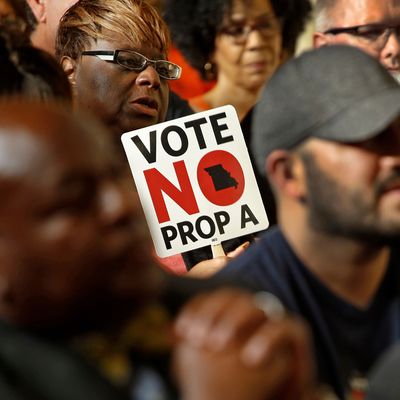
America’s beleaguered labor movement really, really needed this one, and after an impressive investment of time, energy, and money, they got it. In conservative Missouri, a right-to-work law enacted last year by a Republican-controlled legislature and former Republican Governor Eric Greitens was overturned by voters who rejected the anti-labor measure by a comfortable margin. In early returns, rural counties were joining urban labor strongholds in opposing right-to-work.
Republicans had sought to make Missouri the 28th state to adopt right-to-work, which prohibits “union shop” arrangements whereby workers who benefit from collective bargaining agreements can be required to help defray union costs. When unions and their allies succeeded in putting the law on hold pending the ballot measure, the legislature countered by moving the vote from the relatively-high-turnout general election to the primary, hoping to kill it with voter indifference. But it didn’t work.
A reported 5-1 financial advantage for the No on Prop A campaign obviously helped produce this result. But you have to figure there was an intensity factor, too. The Supreme Court’s June decision imposing the equivalent of right-to-work rules on all public-sector workplaces was not just a blow to unions, but a huge setback in the sector of the workforce where labor had made most of its recent membership gains. Labor needed to mount a comeback, and as fate would have it, the opportunity arose first in Missouri, a state with a proud labor tradition but an increasingly pro-corporate state government. Today’s verdict by voters should give pause to anti-union pols and organizations who assume they can roll back collective bargaining rights at will in any state where Republicans have control.
Above all, the Missouri outcome is a much-needed tonic for the troops of the labor movement, and a good rehearsal for its political efforts in November.






























